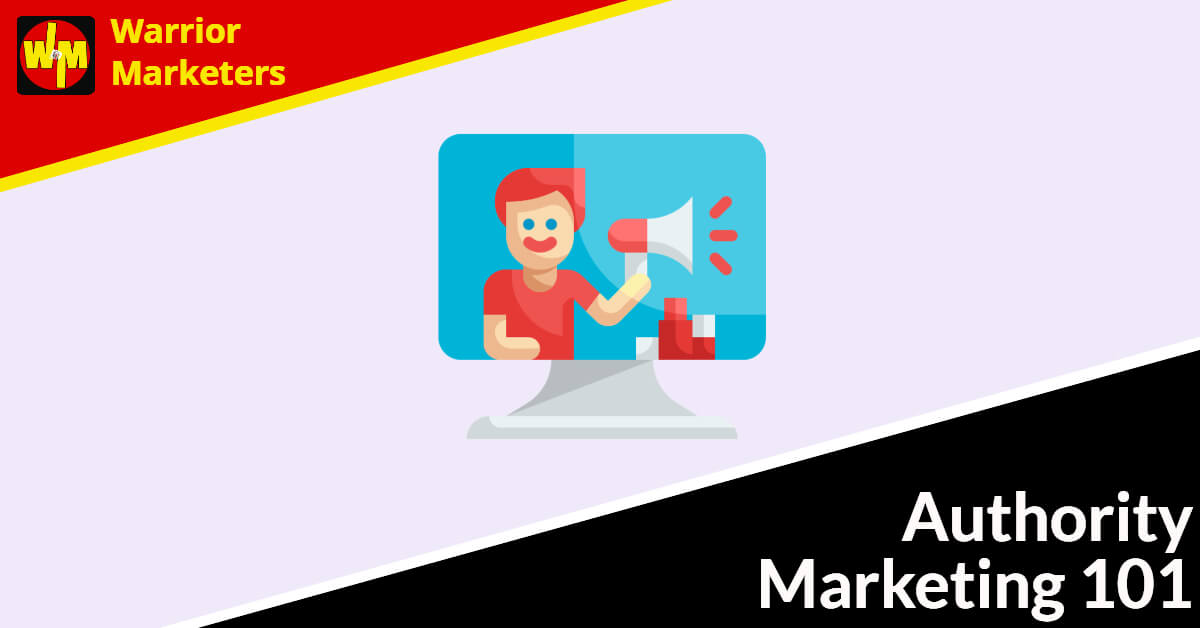Authority Marketing 101


If you want to increase your sales and expand your outreach, you need to position yourself as an authority in your market.
An authority can:
- Persuade visitors into becoming lifelong customers.
- Easily convert traffic into buyers.
- Maximize their income quickly.
- Expand into new markets easily.
- Build a brand and audience in any market.
The first step in your journey to positioning yourself as an authority in your niche is to ask yourself two important questions:
- Who are you?
- What do you have to offer?
Seems like two rather easy questions, right?
Yet answering them carefully and thoughtfully will go the distance in helping you find the best entry point into your niche so you can truly connect with your target audience.
Because ultimately, all people are about is “what is in it for them?”
They need to know how you plan to help them, what you bring to the table and how you will solve their problems.
Authority marketing is about positioning your business in a way that you become the logical choice when someone is making the decision who to turn to for help, advice, products or services.
Your goal is to become the go-to person in your niche, or at the very least, one of the first names that come to mind when someone thinks about who to turn to for help with specific topics.
Note that I didn’t say “specific markets or niches”, I said topic.
That’s because it’s always best to position yourself so that people identify you as an authority on a very specific topic or category rather than the market as a whole.
For example, rather than trying to establish yourself as the authority of all things related to blogging, positioning yourself as someone who is known for teaching people how to drive traffic to blogs, allows you to connect to a specific audience.
This will make your marketing campaigns far more effective and targeted than when casting a wider net.
Of course you can always expand your focus later on so you can reach additional markets and cater to a larger crowd, but when just starting out, it will be a lot easier to position yourself as an authority if you focus on one specific segment of your market, rather than the market as a whole.
Trust me, it’ll cut down on a lot of research, trial and error and testing as well because you’ll be able to spend the majority of your time researching that one specific segment of a market and learning everything you need to know about it.
So, begin by taking some time to decide what area of your niche you’ll venture into. Then you’ll be able to study that segment of the market thoroughly, create a plan of action and execute quickly.
Know Your Audience

Sounds obvious, right?
You need to know WHO you your audience really is and HOW you can help them.
In fact, knowing your audience is one of the most important things you can do when trying to establish yourself as an authority in your market.
This goes beyond just creating a quick overview of your average customer. Instead, spend time on the same websites, in the same circles and on the same platforms that they do.
Get to know the top, burning questions in your market. Find out what makes people tick, what they are responsive to, and what their triggers are. This will go the distance in later helping you create laser-targeted, effective marketing campaigns that will resonate with your core audience.
Always put yourself in your customers’ shoes. They don’t care about your personal goals – they care only about themselves and their needs – and above all else, how you will help them solve a problem.
Read that again: you’re the only one who truly cares about your business growth. Everyone else just cares about how your business can personally help them.
This means that your focus should always be on identifying key areas in your market where people are struggling.
Then you can use that information in many different areas of your business, such as: coming up with customized products and services that fill that need, developing a USP (Unique Selling Proposition) that offers a promise to solve that problem and creating marketing campaigns that trigger your audience into taking action.
Thorough market research is the key to success when it comes to gaining the advantage of becoming an authority.
Those who overlook the importance of truly understanding their audience even before they create a business plan or launch a marketing campaign will quickly discover just how difficult it is to gain traction.
In fact, without knowing your audience, you’re venturing into a market blindfolded with little chance of success.
On the flip side, putting time and effort into researching your market and connecting with your core audience early on, will make all the difference in your ability to create in-demand products and services that are a no-brainer for your customer base.
You’ll be able to stand out from the crowd, position yourself as an expert and easily convince people to give your brand and business a chance.
And your marketing campaigns will be far more successful and ultimately, cost you less in terms of time spent tweaking and split-testing campaigns. Because you’ll know what makes people tick.
If you already have active marketing campaigns in your niche, take a good look at your campaigns from their side of things. Be objective and see if it truly answers their questions and addresses their main goals, fears or concerns.
Are your ads mainly geared towards highlighting features rather than the benefits?
Are your campaigns structured in a way that personally connects with your core audience and goes to work at solidifying your brand?
Do they help position you as an expert?
When it comes to the psychology behind successful brand building and authority positioning, it often hinges on your ability to demonstrate empathy.
The more you do this, the easier it will be to resonate with your audience and connect with your customer base. You’ll come off as more personable, approachable and as someone who truly has their best interests at heart.
There are 3 basic types of empathy: cognitive, emotional, and compassionate.
Cognitive empathy is also known as perspective-taking. It’s the ability to think the way someone else thinks, to imagine you’re them and see how they’d react to something.
It’s a useful skill, especially in marketing, but not exactly what you imagine true empathy should be. Empathy should have an emotional component if it’s going to go the distance.
Emotional empathy is when you inject emotional triggers into your campaigns, ads, sales copy and general content.
How do your customers feel when they look at your ads or read your content? What emotions do you stimulate with your communications, campaigns, emails?
Emotional empathy allows you to feel what others do, like when you hear someone laughing and you smile without knowing exactly what they’re laughing at.
It’s contagious. And when you learn to inject this kind of emotion into your overall brand, your ability to connect with your audience will become one of your super powers. J
Finally, compassionate empathy is the ability to identify someone’s emotion and act on that with a solution.
In this way, you’ll create something that not only takes their feelings into account, but gives them a logical solution to that emotion.
Example: Someone is stressed out because they’re unable to pay their monthly bills. You understand their concerns, what keeps them up at night and act on that with a solution: a business opportunity that will help them gain financial freedom and eliminate stress.
Stress is the emotion you identify and your business positions itself in such a way as to become the solution to eliminating or addressing that emotion.
And it doesn’t have to be a negative emotion either. Someone could feel elated that they have discovered that blogging is a great way to connect with people and help them but they need to know how to create that blog, launch that blog and grow that blog.
The emotion is excitement and happiness. Your solution is to demonstrate to them just how happier they’ll be when they are not only able to share their content with the world, but with your help, they’ll be able to quickly maximize that exposure.
All of this comes down to knowing your market so you can position yourself as the expert and authority they are looking for.
They’ll feel they need you, that you’re the solution to their problems and that you truly understand how they are feeling and what they need most.
That is how you’ll stand out in your market 🙂
If you want to know more about leveraging the power of authority marketing, then check out the featured resource below for a free report that expands on this post; download, read and take action 🙂





























